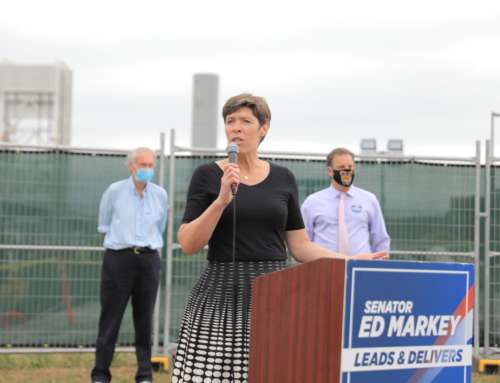(BOSTON) – On Thursday, the Massachusetts House of Representatives and Senate passed nation-leading climate legislation, known as the Next Generation Climate Roadmap bill, which overhauls the state’s climate laws, reduces greenhouse gas emissions, advances the clean energy industry, and prioritizes and protects environmental justice communities.
The bill’s central components contain key provisions from An Act creating a roadmap to a clean and thriving commonwealth, originally filed by Representative Joan Meschino (D-Hull) and known as the “2050 Roadmap.” These 2050 Roadmap provisions update the state’s greenhouse gas emissions reduction goal to net zero by 2050, set strong interim targets, and establish comprehensive and iterative planning mechanisms focused on equity to enable the Commonwealth to achieve this ambitious goal.
“I filed the 2050 Roadmap to align the Massachusetts economy with the pressing urgency of the climate science,” said Representative Meschino. “This bill is fundamentally an economic one. By mandating a comprehensive planning process, locking in the key carbon emission reduction milestones needed to get us to net zero in 30 years, and centering equity in the work, we will create a clean, green economy that works for both people and the planet.”
The Massachusetts Legislature passed the Next Generation Climate Roadmap bill with overwhelming support by both chambers. The culmination of over two years of work since the filing of the original bill, Representative Meschino’s 2050 Roadmap bill attracted widespread support from internal and external partners, stakeholders, and organizations, which generated the momentum for the comprehensive, standard-setting bill that was passed this week.
The passage of the climate bill comes after a joint commitment from Senate President Karen E. Spilka and House Speaker Ronald Mariano to refile quickly the legislation, which was originally vetoed as last session ended. This session, Governor Baker offered amendments to the bill, which have been considered by the Legislature. Yesterday, the House and Senate rejected efforts to slow the rate of progress toward net-zero emissions by 2050, while accepting a number of substantive and technical amendments that improve the bill.
The final climate legislation:
- Sets a statewide net-zero limit on greenhouse gas emissions by 2050 and mandates emissions limits everyfive years, as well as sublimits for transportation, buildings, and other sectors of the economy.
- Codifies environmental justice provisions into Massachusetts law, defining environmental justice populations and providing new tools and protections for affected neighborhoods, including a cumulative impact analysis for certain projects affecting air quality.
- Establishes a municipal opt-in specialized stretch energy code which includes a definition of “net-zero building” and net-zero building performance standards.
- Requires an additional 2,400 megawatts of offshore wind, increasing the total authorization to 5,600 megawatts in the Commonwealth.
- Directs the Department of Public Utilities (DPU), the regulator of the state’s electric and natural gas utilities, to balance priorities going forward: system safety, system security, reliability, affordability, equity, and, significantly, reductions in greenhouse gas emissions.
- Sets appliance energy efficiency standards for a variety of common appliances including plumbing, faucets, computers, and commercial appliances.
- Adopts several measures aimed at improving gas pipeline safety, including increased fines for safety violations, provisions related to training and certifying utility contractors, and setting interim targets for companies to reduce leak rates.
- Requires utilities to include an explicit value for greenhouse gas reductions when they calculate the cost-effectiveness of an offering of MassSave.
- Increases the Renewable Portfolio Standard (RPS) by 3 per cent each year from 2025–2029, resulting in 40 per cent renewable energy by 2030.
- A national first, this legislation factors the “carbon sequestration” capacity of Massachusetts’ natural and working lands directly into our emissions reduction plans.
- Prioritizes equitable access to the state’s solar programs by low-income communities.
- Sets benchmarks for the adoption of clean energy technologies including electric vehicles, charging stations, solar technology, energy storage, heat pumps and anaerobic digestors.
- Establishes $12 million in annual funding for the Massachusetts Clean Energy Center to create a pathway to the clean energy industry for environmental justice populations, minority-owned and women-owned businesses, and fossil fuel workers.
- Provides solar incentives for businesses by exempting them from the net metering cap to allow them to install solar systems on their premises to help them offset their electricity use and save money.
- Creates a first-time greenhouse gas emissions standard for municipal lighting plants that requires them to purchase 50 percent non-emitting electricity by 2030, 75 percent by 2040 and “net zero” by 2050.
The bill now returns to the Governor’s desk.
